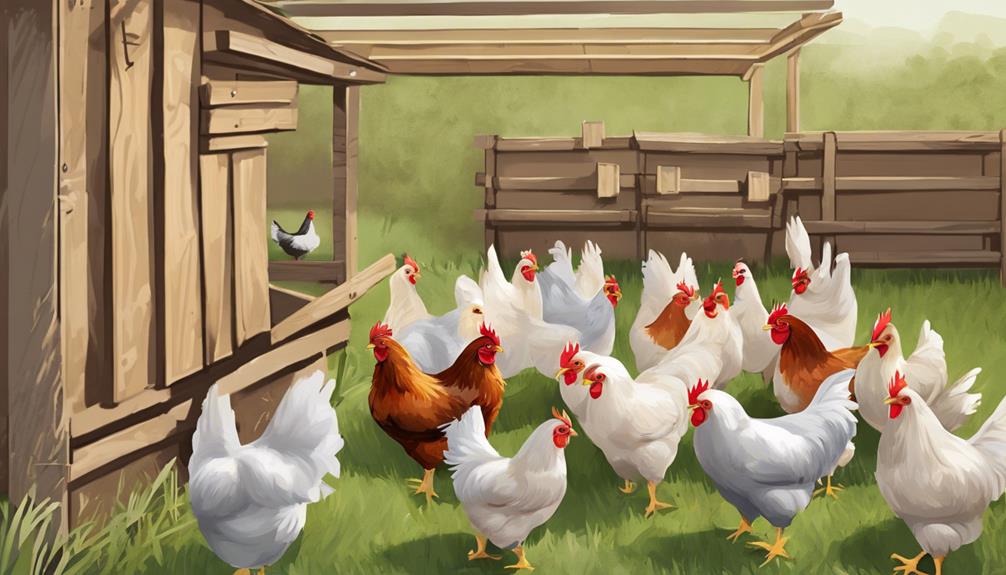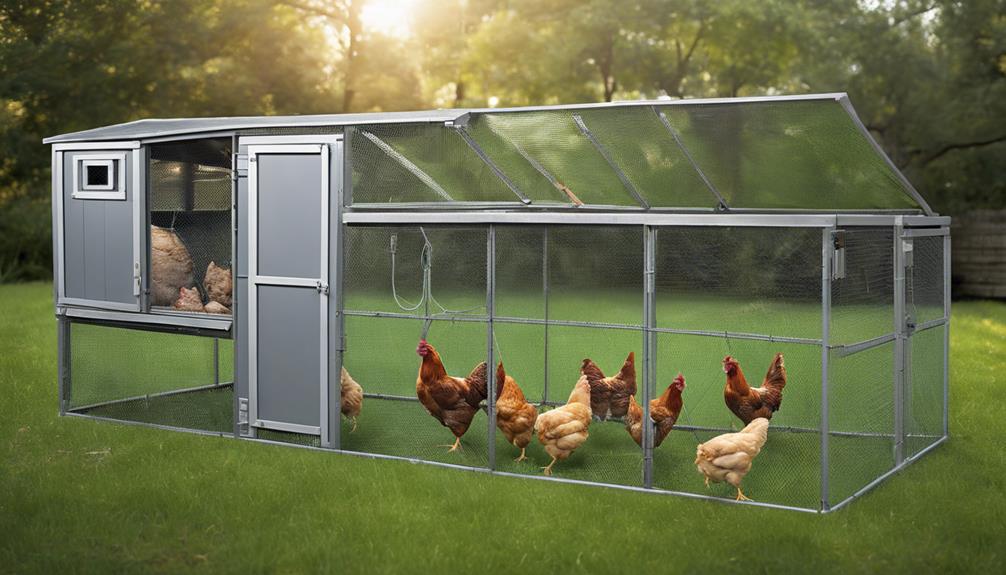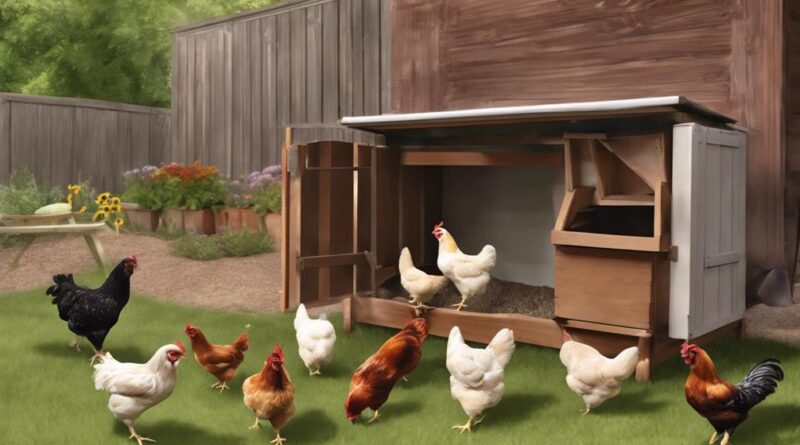10 Essential Tips for Starting Chicken Breeding"
Embarking on chicken breeding? Begin by selecting the right breeds based on various traits. Establish a well-ventilated coop and predator-proof run. Provide a balanced diet for proper nutrition and health. Keep the coop clean by maintaining regular hygiene practices. Monitor chicken health vigilantly to prevent diseases. Manage egg production with nutrient-rich diets and stress-free environments. Master incubation and hatching techniques for successful breeding. Safeguard your flock against predators and pests with secure fencing. Connect with other breeders for valuable insights and support on your breeding journey. Tips revealed here can set you on the right path to successful chicken breeding.
Selecting the Right Chicken Breeds
When starting chicken breeding, carefully selecting the right chicken breeds is crucial for success in your venture. Breeding techniques and genetic selection play a pivotal role in determining the quality and productivity of your flock. Different chicken breeds have varying characteristics such as egg-laying capacity, meat production, adaptability to different climates, and resistance to diseases. Conduct thorough research on different breeds to match your breeding goals with the traits of the selected breeds.
Genetic selection is essential in maintaining and improving desirable traits in your chicken flock. Select breeds that align with your objectives, whether it be egg production, meat quality, or dual-purpose breeds. By understanding the genetic makeup of different breeds, you can make informed decisions to create a healthy and productive flock.
Consider breeding challenges and market demand when selecting chicken breeds. Some breeds may be more susceptible to certain diseases or require specific care, affecting your overall breeding success. Additionally, market demand for certain chicken products can influence your breeding choices. For example, if there's a high demand for organic eggs, selecting breeds known for their excellent egg-laying capabilities can be advantageous.
Setting Up a Coop and Run
To establish a successful chicken breeding operation, it's imperative to set up a well-designed coop and run that caters to the needs of your flock. Here are three essential considerations to keep in mind when setting up your coop and run:
- Coop Design and Ventilation:
When designing your coop, prioritize adequate ventilation to ensure good air circulation and prevent the build-up of harmful ammonia fumes. Choose a design that allows for natural light to enter the coop while also providing insulation during extreme weather conditions. Consider the size of your flock when determining the coop dimensions to allow ample space for nesting boxes, roosts, and feeding areas.
- Run Size and Fencing:
The size of the run is crucial for the overall well-being of your chickens. A larger run allows your flock to engage in natural behaviors such as scratching and foraging. Ensure the fencing is secure and predator-proof to protect your chickens from potential threats. Consider burying the fencing underground to prevent predators from digging their way into the run.
- Accessibility and Maintenance:
When setting up your coop and run, consider easy access for cleaning and maintenance. Design the coop with doors and openings that allow you to reach all areas easily. Regularly clean the coop and run to ensure a healthy environment for your chickens and reduce the risk of diseases.
Providing Proper Nutrition
Proper nutrition is fundamental for maintaining the health and productivity of your chicken flock. Meeting the feeding requirements of your chickens is crucial for their overall well-being and performance. A balanced diet that includes a mix of grains, greens, proteins, and minerals is essential for the health and growth development of your birds.
Chickens require a diet rich in protein to support their growth and egg production. A commercial poultry feed that's specifically formulated for chickens is a good base for their diet. Additionally, offering dietary supplements like calcium for strong eggshells or grit for digestion can further enhance their health and productivity.
Neglecting the nutritional needs of your chickens can have serious health implications. Poor diet can lead to stunted growth, decreased egg production, and weakened immune systems, making your flock more susceptible to diseases. Ensuring that your chickens receive the proper nutrients they need won't only keep them healthy but also promote optimal growth and development.
Maintaining Cleanliness in the Coop
Maintaining cleanliness in the coop is crucial for the health and well-being of your chicken flock. Proper coop hygiene and sanitation practices are essential to prevent the spread of diseases and ensure a healthy environment for your chickens.
Here are three key practices to help you maintain cleanliness in your coop:
- Regular Cleaning Schedule: Establish a routine cleaning schedule to remove droppings, soiled bedding, and leftover feed. Cleaning should include not only the floor but also nesting boxes, perches, and feeders. Regularly remove any wet or soiled bedding to prevent bacterial growth and ammonia buildup.
- Proper Ventilation: Good airflow is crucial in maintaining a clean coop. Proper ventilation helps remove excess moisture, ammonia, and dust, which can lead to respiratory issues in chickens. Ensure that your coop has adequate ventilation without creating drafts that can cause cold stress.
- Pest Control: Implement measures to control pests such as flies, rodents, and mites. These pests not only disturb your chickens but can also spread diseases. Use safe and appropriate pest control methods to keep your coop free from infestations.
Monitoring Chicken Health
Regularly monitoring the health of your chickens is vital to ensure early detection of any potential issues and maintain a thriving flock. Disease prevention is key to keeping your chickens healthy. Implementing biosecurity measures, such as limiting exposure to wild birds and quarantining new birds before introducing them to your flock, can help prevent the spread of diseases.
Health monitoring involves observing your chickens daily. Look for signs of illness like lethargy, changes in appetite, abnormal droppings, sneezing, coughing, or discharge from the eyes or nostrils. Conduct regular health checks to monitor weight, comb color, and overall appearance.
Parasite control is another essential aspect of maintaining chicken health. Regularly inspect your chickens for external parasites like mites and lice. Keep the coop clean and dry to prevent infestations. Additionally, follow a vaccination schedule recommended by a veterinarian to protect your flock from common diseases such as Marek's disease, infectious bronchitis, and Newcastle disease.
Understanding Chicken Behavior
Understanding chicken behavior is crucial for effectively managing your flock and ensuring their well-being. Chickens have intricate social structures and behaviors that influence their overall health and productivity. Here are some key aspects to consider:
- Roosting habits, social interactions: Chickens have a natural instinct to roost, preferring elevated spaces to rest and sleep. Understanding their roosting habits can help you provide suitable roosting areas within the coop. Additionally, chickens are social animals that establish pecking orders within the flock. Observing their social interactions can help you identify any signs of bullying or aggression that may require intervention.
- Feeding preferences, flock dynamics: Chickens have specific feeding preferences and dietary needs. By observing their feeding behaviors, you can ensure they're receiving adequate nutrition. Understanding flock dynamics is essential for maintaining harmony within the group. Introducing new chickens or making changes to the flock structure can disrupt the dynamics, so it's important to monitor their interactions closely.
- Environmental responses, communication: Chickens exhibit various behaviors in response to their environment, such as seeking shade when it's hot or dust bathing to keep clean. By understanding these responses, you can make adjustments to their living conditions to keep them comfortable. Chickens also communicate through vocalizations and body language, conveying information about their well-being and alerting others to potential dangers. Learning to interpret their communication cues can help you address any issues promptly.
Managing Egg Production

Observing your flock's behavior can provide valuable insights into optimizing egg production on your chicken farm. By closely monitoring your chickens, you can identify patterns and make adjustments to maximize efficiency and improve the quality of the eggs they produce. One key aspect of managing egg production is ensuring that your hens are receiving a balanced diet rich in nutrients essential for egg-laying. Supplementing their diet with calcium can help strengthen eggshells, reducing the likelihood of cracks and imperfections that can impact quality.
In addition to nutrition, providing your chickens with a comfortable and stress-free environment is crucial for maximizing egg production. Ensure that your coop is clean, well-ventilated, and free from overcrowding to promote healthy laying habits. Proper lighting is also essential, as hens require a certain amount of light each day to maintain consistent egg production.
Regularly collecting eggs from the nesting boxes is important to prevent hens from becoming broody, which can disrupt the laying cycle. By promptly removing eggs, you can encourage continued production and prevent potential issues. Monitoring the number of eggs laid by each hen can also help you identify any potential health issues or inconsistencies in production, allowing you to take proactive measures to maintain optimal egg quality.
Handling Incubation and Hatching
To ensure successful hatching, precise temperature and humidity control are critical factors in handling incubation and hatching of chicken eggs. Maintaining the right environment inside the incubator is essential for the development of healthy chicks.
Here are some key tips to help you effectively manage incubation and hatching:
- Temperature Control:
- Set the temperature in the incubator according to the specific requirements of the chicken breed you're hatching. Small temperature fluctuations can have a significant impact on the hatch rate.
- Regularly monitor the temperature inside the incubator using a reliable thermometer. Make adjustments as needed to ensure it stays within the recommended range.
- Candling Eggs:
- Candling is a technique used to check the fertility of eggs and monitor the development of the embryo. Use a bright light source to shine through the egg and observe the internal changes. Discard any eggs that show signs of infertility or development issues.
- Perform candling around day 7 and day 14 of the incubation period to remove any non-viable eggs and track the progress of the developing embryos.
- Humidity Control:
- Maintain the correct humidity levels in the incubator to prevent the eggs from losing too much moisture. Humidity requirements may vary during different stages of incubation, so it's important to follow guidelines specific to the breed you're hatching.
- Use a hygrometer to measure humidity levels accurately and adjust the humidity by adding or removing water from the incubator as needed.
Dealing With Predators and Pests

Maintaining the security of your chicken breeding operation involves implementing effective strategies to prevent and manage predators and pests that can threaten the well-being of your flock. Predator prevention is crucial in safeguarding your chickens. Install sturdy fencing around the perimeter of your coop and run to deter predators like foxes, raccoons, and birds of prey. Consider using hardware cloth with small openings to prevent digging or squeezing through. Additionally, secure locks on all coop openings, including doors and windows, to prevent easy access for predators.
In terms of pest control, implementing security measures and deterrent strategies is essential. Keep your coop and surrounding areas clean and free of food scraps to avoid attracting pests like rats and mice. Regularly clean feeders and waterers to prevent infestations. Consider using natural pest deterrents such as diatomaceous earth or herbs like lavender and mint to repel insects.
Furthermore, consider installing motion-activated lights or sound devices to scare off nighttime predators. Secure any potential entry points in your coop, such as gaps in walls or roofs, to prevent pest infestations. Regularly inspect your property for signs of predators or pests and take immediate action to address any issues. By being proactive and implementing these predator prevention and pest control strategies, you can ensure the safety and well-being of your chicken flock.
Connecting With Other Breeders
Wondering how you can connect with other breeders to enhance your chicken breeding knowledge and network? Building relationships with fellow breeders can be invaluable for your journey in chicken breeding. Here are some effective ways to connect with other breeders:
- Join Breeders' Communities: One of the best ways to connect with other breeders is by joining online or local breeders' communities. These communities often provide a platform to discuss breeding techniques, share experiences, and seek advice from seasoned breeders. Engaging in these communities can help you stay updated on the latest trends in chicken breeding and build a network of like-minded individuals.
- Attend Breeding Workshops and Events: Participating in breeding workshops, seminars, or events can be a great way to meet and connect with other breeders. These gatherings often offer opportunities to learn new breeding techniques, interact with experienced breeders, and access valuable resources. Networking at such events can open doors to collaborations and mentorship opportunities.
- Utilize Online Resources: In today's digital age, there are numerous online resources available for chicken breeders. Platforms like forums, social media groups, and breeding websites can serve as powerful tools to connect with breeders worldwide. These resources can provide a wealth of information on breeding practices, troubleshooting common issues, and accessing valuable resources for your breeding endeavors.
Frequently Asked Questions
How Do I Prevent My Chickens From Getting Bored in the Coop?
To prevent your chickens from getting bored in the coop, offer enrichment activities like hanging vegetables, providing free-range time, and scattering grains for foraging opportunities.
Introduce toy ideas such as hanging mirrors or chicken swings. These activities will keep your chickens mentally stimulated and physically active, reducing boredom and potential negative behaviors.
Can I Keep Different Chicken Breeds Together in One Coop?
Yes, you can keep different chicken breeds together in one coop. However, this may present breeding challenges if you're aiming for specific traits.
To manage this, consider coop organization to minimize aggression and ensure all chickens have adequate space. Monitor the interactions closely and be prepared to separate them if necessary.
Proper planning and observation will help maintain a harmonious environment for your mixed-breed flock.
What Is the Best Way to Introduce New Chickens to an Existing Flock?
When introducing new hens to your existing flock, it's essential to proceed with caution. Start by isolating the newcomers but within sight of the established chickens.
After a week, allow them to interact through a barrier. Once they seem comfortable, introduce them during the evening to reduce aggression.
Monitor their interactions closely to ensure they integrate well. Socializing chickens gradually can help prevent conflicts and ensure a smooth introduction process.
How Often Should I Clean and Replace Bedding in the Coop?
When caring for your chickens, maintaining good coop hygiene is crucial for their health. Regular bedding maintenance is key to preventing the buildup of bacteria and keeping your poultry healthy.
Aim to clean and replace bedding in the coop at least once a week to ensure a clean and comfortable environment for your birds. Proper bedding management not only promotes good poultry health but also helps in managing odors and pests in the coop.
What Measures Can I Take to Protect My Chickens From Airborne Diseases?
To protect your chickens from airborne diseases, focus on ventilation management to ensure proper air circulation in the coop.
Implement biosecurity practices like limiting visitors and equipment sharing to prevent disease spread.
Regularly clean and disinfect the coop to control airborne pathogens.
Consider using air filtration systems to further reduce the risk of disease transmission.
Conclusion
In conclusion, starting chicken breeding requires careful planning and attention to detail. By selecting the right breeds, providing proper nutrition, and maintaining cleanliness in the coop, you can set yourself up for success.
Monitoring chicken health, managing egg production, and handling incubation and hatching are also crucial aspects to consider.
Dealing with predators and pests, as well as connecting with other breeders, will help you navigate challenges and ensure a successful chicken breeding venture.
